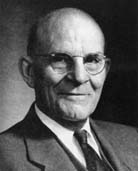 Robert R. Williams, Jr. (February 16, 1886 - October 2, 1965), was a telephone company researcher who in his spare time developed ways to synthesize vitamins that helped fight malnutrition and vitamin-deficiency diseases.
Robert R. Williams, Jr. (February 16, 1886 - October 2, 1965), was a telephone company researcher who in his spare time developed ways to synthesize vitamins that helped fight malnutrition and vitamin-deficiency diseases.
The vitamin research was conducted in his spare time with the aid of grants and space provided by Columbia University and others. Williams isolated thiamine in crystalline form in 1933 and synthesized vitamin B two years later. Merck & Company began commercial production of thiamine in 1936.
Williams' patent, granted in 1942, was a forerunner in the field of chemically reconstructed vitamins.
In addition to his interest in curing Oriental deficiency diseases, Williams was instrumental in the enriching flour, cornmeal, and other cereal grains in this country, wiping out the pellagra and riboflavin deficiency common among poor people.
Born in Nellore, India, the son of Baptist missionaries, Williams was introduced early in life to the suffering caused by malnutrition. Beriberi, common among rice-eating people in Asia, caused nerve disorders, body swelling, and death.
When he was 10, Williams returned with his family to the United States where the children attended school in Ottawa, Kansas. Williams earned his B.S. (1907) and an M.S. (1908) in chemistry from the University of Chicago.
The East lured him back, however, and Williams taught school in the Philippine Hill country while awaiting a job opening in the Manila Bureau of Science. There he began a 25-year search for a cure for Beriberi. During World War I Williams was recalled to the Washington, D.C., Bureau of Science to work on war projects. To support a wife and family, he took a job with the Bell Telephone Company in New York, where he would serve as chemical director for 20 years.